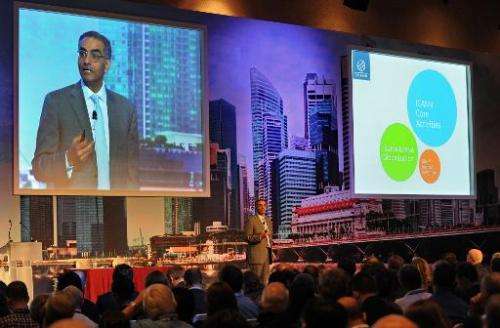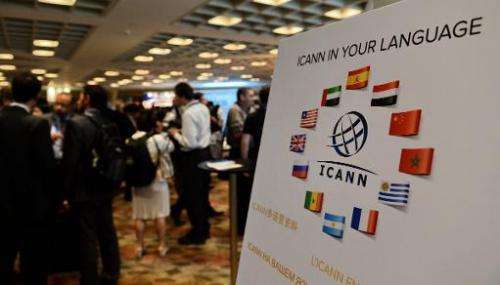Singapore talks on Internet's future hear plea for freedom

Control of the Internet should be handed from US supervision to a diverse group of stakeholders, and not to governments that could limit freedoms, a meeting on the web's future heard Monday.
Organisers also said that a US decision to relinquish control was not the result of any one event—after speculation it came under pressure from snooping disclosures from former National Security Agency contractor Edward Snowden.
The talks are the first global consultation since the US announced this month it will hand control of the Internet's technical operations to "multi-stakeholders" including IT organisations, businesses, governments, civil society groups and academia.
The four-day Singapore meeting was convened by the Internet Corporation for Assigned Names and Numbers (ICANN), which the US has tasked with guiding the transition.
ICANN, a US-based non-profit group, controls domain names and Internet addresses under a contract that expires in September 2015, by which time back-end operations of the Internet are expected to be under new administration.
ICANN chief executive Fadi Chehade said any transition plan must adhere to the principles of keeping the Internet open and secure.
"Whatever we do to replace the US stewardship must be rooted in the multi-stakeholder model," Chehade told some 2,000 delegates at the meeting.
"We cannot come back to them (the US) with a transition plan that hands our important work to a government, a group of governments (or to) an inter-governmental organisation. No, it will not work."
His remarks came in response to moves by countries including China and Russia to have the function ceded to the UN's International Telecommunications Union, which is made up of national governments.

Critics say that having governments, especially those with authoritarian leaders, control the Internet's domain name system would allow states to clamp down on dissent and the freedom of expression.
At present, the US government approves top level domain names such as .com, .net and .org.
However, it also has control over domain names that involves countries like .ir for Iran, .ru for Russia and .cn for China, a situation that has sparked resentment from some governments.
"The political fact is that some governments believe that the country code top level names belong to them. It's like an issue of national sovereignty and pride," said Paul Wilson, director general of the Asia Pacific Network Information Centre (APNIC), the region's Internet registry.
"Some governments have been very unhappy that the US government has this ability to exercise control over the names... So it's very significant for the US government to decide to release this from their direct control and hand it over to everyone," he told AFP in an interview.
Wilson said he hopes there will be no showdown between now and 2015.
"I think some parties and governments may just oppose this transition and in that case they still need to work out if they are going to influence how its done or stay out," he told AFP in an interview ahead of the meeting.
Chehade dismissed reports the US was under pressure to relinquish oversight because of an "event or a person", in an apparent reference to the outcry that followed Snowden's revelations of massive trawling of the Internet by US intelligence agencies.
He said the US made the decision because it felt the global Internet community was ready to take over after years of collaboration.
"From my perspective, the decision of the US depoliticises Internet governance," he said.
A broader meeting on the overall future of the web is to be held at the "Net Mundial" conference in Sao Paulo, Brazil next month.
© 2014 AFP


















